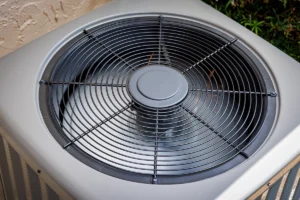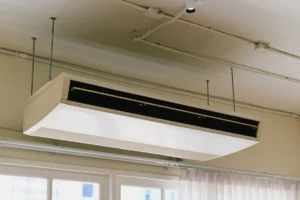The air handler serves as the indoor powerhouse of your heating and cooling system, yet many homeowners overlook its crucial role. This vital component works tirelessly to circulate conditioned air throughout your home, directly impacting your daily comfort and system efficiency.
What Does an Air Handler Do?
Think of your air handler as the heart of your HVAC system. It pulls in air, conditions it according to your temperature settings, and distributes it through your ductwork. This process happens continuously while your system runs, ensuring consistent comfort throughout your space.
Essential Components of Air Handlers
Modern air handlers integrate several sophisticated components working in harmony. At their core is the blower assembly, featuring a variable-speed motor that precisely adjusts airflow while minimizing energy consumption. The advanced fan design incorporates noise-reduction technology, while direct-drive systems enhance reliability and eliminate belt maintenance.
The heat exchange coil forms another crucial element, enabling both heating and cooling functions through a network of copper tubing and aluminum fins. This design maximizes heat transfer efficiency while maintaining durability. The integrated filtration system removes airborne particles, not only improving indoor air quality but also protecting sensitive internal components from debris accumulation.
Signs of Air Handler Problems
Recognizing potential issues early helps prevent major system failures. Common warning signs include unusual noises during operation, reduced airflow from vents, and inconsistent temperature control throughout your space. You might notice higher energy bills or longer run times to achieve desired temperatures. Some spaces may feel perfectly comfortable while others struggle to maintain proper conditioning.
Water leaks near the unit, unusual odors from registers, and increased indoor humidity levels can also indicate developing problems. Pay attention to excessive vibration during operation, as this often signals mechanical issues requiring prompt attention.
The Impact of Air Handler Efficiency
An efficiently operating air handler significantly impacts both comfort and operating costs. Modern systems utilize advanced motor technology and sophisticated controls to optimize performance while minimizing energy consumption. This translates to more consistent temperatures, better humidity control, and reduced utility bills.
Proper maintenance keeps your system operating at peak efficiency. Regular professional service includes comprehensive cleaning, performance testing, and adjustment of critical components. This proactive approach helps prevent unexpected breakdowns while extending equipment life.
Professional Maintenance Essentials
Professional maintenance involves thorough inspection and service of all critical components. Technicians clean and verify proper operation of the heat exchange coil, test motor performance, and ensure proper control system function. They’ll check electrical connections, verify proper airflow, and clean the condensate system to prevent water damage.
Home maintenance also plays a vital role in system performance. Regular filter changes, keeping the area around the unit clean, and monitoring system operation help maintain efficiency between professional service visits. Watch for changes in performance or unusual operation that might signal developing problems.
Advanced Technology Integration
Modern air handlers incorporate sophisticated technology to enhance performance and efficiency. Variable-speed operation allows precise comfort control while minimizing energy use. Smart controls enable remote operation and monitoring through mobile devices, while advanced sensors continuously optimize system operation.
These systems can integrate with home automation platforms, providing seamless control of your indoor environment. Some units include predictive maintenance capabilities, alerting you to potential issues before they cause system failure.
Installation Considerations
Proper installation significantly impacts air handler performance and efficiency. The unit location must provide adequate access for maintenance while ensuring proper return air flow. Correct sizing proves crucial – an oversized or undersized unit won’t deliver optimal comfort or efficiency.
Professional installers carefully match system components, ensuring compatibility between indoor and outdoor units. They verify proper refrigerant charge, electrical connections, and control system operation. This attention to detail helps ensure reliable, efficient operation.
Long-Term Benefits of Quality Equipment
Investing in a quality air handler delivers significant long-term advantages. Modern units offer superior efficiency, reducing monthly operating costs while providing better comfort control. Advanced filtration options improve indoor air quality, while better humidity control enhances comfort and protects your home.
Proper maintenance helps realize these benefits throughout the equipment’s life. Regular service prevents minor issues from becoming major problems, while maintaining optimal efficiency helps control operating costs.
Making Informed Decisions
Understanding your air handler helps you make better decisions about maintenance and eventual replacement. Consider factors like age, efficiency, and repair history when evaluating your system. Modern units offer significant advantages in efficiency and comfort control compared to older equipment.
Keep detailed maintenance records and monitor system performance. This information helps identify developing problems and makes informed decisions about repairs or replacement easier. Work with qualified professionals who understand current technology and can properly maintain your equipment.
Future Technologies and Trends
The HVAC industry continues advancing, with new technologies improving efficiency and control. Look for continued development in motor efficiency, control systems, and integration capabilities. Smart technology integration will expand, offering better monitoring and control options.
Manufacturers focus on improving reliability while reducing operating costs. Enhanced diagnostic capabilities help identify problems earlier, while better maintenance prediction helps prevent unexpected failures. These advances help ensure comfortable, efficient operation throughout the equipment’s life.
Residential Applications and Considerations
Air handlers in residential settings face unique challenges and requirements. Single-family homes need carefully balanced airflow distribution to maintain consistent comfort across all living spaces. Multi-level homes present particular challenges, often requiring specialized zoning solutions to address temperature stratification between floors. Finished basements demand precise humidity control to prevent moisture-related issues, while attic installations require extra attention to insulation and condensate management.
Proper sizing becomes especially critical in residential applications. An oversized system might cool quickly but fails to properly dehumidify, while an undersized unit struggles to maintain comfort during extreme weather. Professional load calculations consider factors like local climate, home construction, insulation levels, and occupancy patterns to determine optimal system size.
Commercial and Industrial Applications
Commercial environments present different demands for air handler systems. Office buildings require precise temperature control to maintain productivity and comfort for numerous occupants. Healthcare facilities demand superior filtration and ventilation to maintain sterile environments and protect patient health. Educational institutions need systems that operate quietly while handling varying occupancy loads throughout the day.
Industrial applications often require robust construction to handle harsh environments while maintaining precise control over temperature and humidity. Data centers need particularly careful attention to cooling and humidity control to protect sensitive electronic equipment. These specialized applications often incorporate redundant systems and advanced monitoring capabilities to prevent costly downtime.
Energy Optimization Strategies
Modern air handlers incorporate various strategies to optimize energy usage. Variable-speed technology allows systems to operate at lower speeds when possible, significantly reducing energy consumption while maintaining comfort. Advanced control algorithms learn building usage patterns and adjust operation accordingly, preventing unnecessary runtime while ensuring spaces are comfortable when needed.
Heat recovery systems capture energy that would otherwise be wasted, improving overall system efficiency. Smart zoning capabilities prevent conditioning unused spaces, while occupancy sensors automatically adjust system operation based on actual space usage. These technologies work together to minimize energy consumption while maintaining optimal comfort.
Weather Impact and System Adaptation
Local climate significantly influences air handler operation and efficiency. In regions with high humidity, systems must work harder to maintain comfort through proper moisture removal. Cold climates require careful attention to freeze protection and defrost cycles, while areas with extreme temperature swings need systems capable of adapting to rapidly changing conditions.
Modern systems incorporate weather-responsive controls that adjust operation based on outdoor conditions. This proactive approach helps maintain comfort while optimizing efficiency across varying weather patterns. Some systems even incorporate predictive algorithms that adjust operation based on weather forecasts, ensuring optimal performance under changing conditions.
Maximizing Your Air Handler’s Performance
Your air handler plays a vital role in your comfort and system efficiency. Understanding its operation and maintenance needs helps ensure reliable performance and optimal comfort. Regular professional maintenance, coupled with proper home care, helps prevent problems while maintaining efficiency. This comprehensive approach helps protect your investment while ensuring reliable comfort throughout the year.
By staying informed about your air handler’s operation and needs, you can make better decisions about maintenance and eventual replacement. Working with qualified professionals ensures your system receives proper care while maintaining optimal performance. This attention to detail helps maximize comfort and efficiency while protecting your investment in quality HVAC equipment. Call Professor Heat Pump today to schedule a maintenance check-up on your system!









